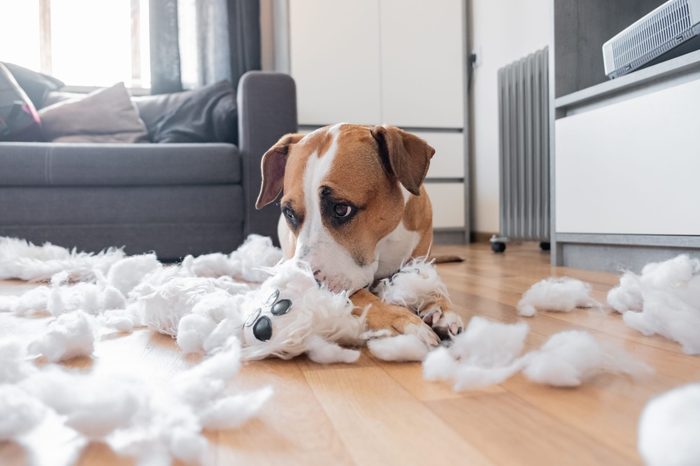Destructive behaviour in dogs can be a frustrating and potentially expensive issue for pet owners. Whether it’s chewing on furniture, digging up the garden, or tearing apart shoes, these behaviours can cause significant stress. So in this post, we’ll learn how to stop destructive behaviour in dogs so that you and your dog can enjoy a happier home life.
Identify the Cause
The first step in addressing destructive behaviour is to understand its root causes. Common factors include boredom, separation anxiety, lack of exercise, or the need for attention. Each dog is unique, and their reasons for destructive behaviour can vary widely. Observing when and where these behaviours occur can provide valuable clues to their underlying causes.
Boredom and Lack of Exercise
Dogs are naturally active and curious animals that require regular mental and physical stimulation. A lack of exercise can lead to pent-up energy, resulting in destructive behaviour as a way to relieve boredom or stress. Ensuring your dog has enough physical activity and mental challenges is key to curbing destructive behaviour. Daily walks, playtime, and interactive toys are all great ways to help with this.
Separation Anxiety
Separation anxiety is another common cause of destructive behaviour in dogs. This condition is characterised by dogs becoming distressed and destructive when left alone. Strategies to address separation anxiety include gradually acclimatising your dog to being alone, providing comforting toys or garments with your scent, and considering the use of calming aids or consulting a professional for severe cases.
Training and Positive Reinforcement
Implementing consistent training and using positive reinforcement can significantly reduce destructive behaviour. Teach your dog commands and reward them for positive behaviour. Redirecting their attention to appropriate toys or activities when they begin to exhibit destructive behaviour is also effective. Consistency and patience are key in training, as dogs learn through repetition and positive associations.
Professional Help
In cases where destructive behaviour persists despite your best efforts, seeking the help of a professional dog trainer may be necessary. These experts can provide tailored strategies and support to address your dog’s specific issues.
Know How to Handle Destructive Behaviour in Dogs
Dealing with destructive behaviour in dogs requires understanding, patience, and consistent effort. By identifying the root cause, providing adequate exercise and mental stimulation, employing positive reinforcement training, and seeking professional advice when needed, you can help your furry friend overcome these behaviours. This not only improves the quality of life for your dog but also strengthens the bond between you and your pet.

